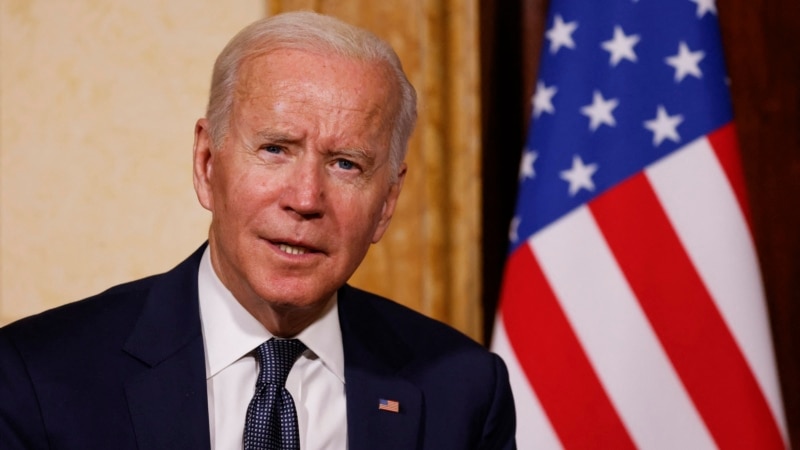
U.S. President Joe Biden will arrive at COP 26, the United Nations Climate Change Conference being held in Glasgow next week, with the promise, if not the guarantee, that the United States is about to commit to the largest single investment in combating climate change in history.
The White House and Democratic leaders in Congress on Thursday announced a scaled-back version of the president’s Build Back Better climate and social spending package. While less ambitious than earlier versions, the package contains $555 billion in spending directed at reducing the country’s greenhouse gas emissions to between 50% and 52% of 2005 levels by 2030.
That matches the Nationally Determined Contribution (NDC) the U.S. committed to when the Biden administration rejoined the Paris climate change accord earlier this year. According to activists and experts, it considerably strengthens Biden’s ability to assert a leadership role for the U.S. in the global effort to slow climate change.
‘Show us first’
“Without this, I think it would have been tremendously hard for the U.S. delegation to appear with a credible claim that the U.S. is ‘back,’” said Michael Mehling, deputy director of the Center for Energy and Environmental Policy Research at the Massachusetts Institute of Technology.
“It has an NDC of 50% to 52%, and it has the means to achieve that,” he told VOA. “Without it, I think people would have just said, ‘Yeah, show us first.’”
In a statement released Thursday, Sierra Club Legislative Director Melinda Pierce congratulated the president and Democrats in Congress for “advancing a bold vision for historic climate action,” and urged lawmakers to finalize an agreement on the legislation as soon as possible.
“This is a bold vision for clean energy and climate action that the President can present at the U.N. Climate Change Conference in Glasgow, Scotland, to demonstrate that the United States is committed to taking the immediate and bold action necessary to tackle the climate crisis as a top priority,” Pierce said. “We urge Congress to immediately deliver a full Build Back Better Act that fulfills this promise, because we have no time to wait.”
No guarantees
The president and his allies are behaving as though they are on the cusp of a major legislative achievement. However, it remains possible that infighting and policy disagreements among Democrats on Capitol Hill could derail the deal as the final legislative language is being prepared.
The two wild cards are West Virginia Senator Joe Manchin and Arizona Senator Kyrsten Sinema, neither of whom has said that they will definitely support the package.
Manchin has already forced his colleagues to remove some of the climate elements of the original package, which he saw as overly punitive toward existing fossil fuel companies. Manchin, whose state has a long history of coal mining and still relies on coal-fired power plants for much of its electricity, also has a financial stake in the coal industry.
He has also expressed hesitation over a non-climate-related part of the package that would deliver benefits to families with young children.
Sinema has shot down several versions of the package over disagreements about how to pay for it. She objected to raising tax rates and to changing the way investments are taxed at death. It is unclear whether she will support the current package, which contains income-tax surcharges on people earning more than $10 million per year, and on income that business owners receive on a “pass-through” basis.
Because the Democrats hold a razor-thin majority in the Senate, either Manchin or Sinema could torpedo Biden’s Build Back Better package – including the climate change provisions – by voting no.
Broad-based spending
The largest part of the climate spending in the bill is $320 billion in tax credits, spread over 10 years, aimed at making a wide array of green technologies cheaper and easier to implement.
Among other things, it would cut the price of installing home solar panels by about 30% and would offer rebates of up to $12,500 for the purchase of an electric vehicle, provided it is made in the U.S. with domestic parts and unionized labor. The package would also create financial incentives for the development of clean mass transit, buses and trucks.
The next-largest element of the package is $110 billion to incentivize the creation of a domestic supply chain for the delivery of products that will be key to broad electrification of the U.S., including batteries, solar cells and other technologies.
An additional $105 billion would go toward building resiliency in communities that are already feeling the drastic effects of climate change through extreme weather events. This includes funding for a Civilian Conservation Corps that the administration says will hire 300,000 Americans.
Rounding out the spending is $20 billion that would go toward government procurement of next-generation green technologies – essentially helping to create a market for the products and services that the other elements of the proposal will be subsidizing.
Looking on the bright side
Climate activists definitely didn’t get everything they wanted in the package currently before Congress. Among other things, Biden’s proposed Clean Energy Production Program, which would have rewarded electrical utilities that increase their use of renewable energy by 4% per year and punished those that did not, was scuttled after Manchin strongly objected to it.
But on Friday, with the possibility of the $555 billion package actually becoming law, environmentalist groups were focused on the positive side of things.
“I’ve been around Washington for 20 years, and I’ve worked on energy and environmental issues for over 20 years,” said Toby Short, associate vice president for federal affairs with the Environmental Defense Fund. “A half a trillion dollars in climate and energy investments? It’s incredible. From EDF’s perspective, we’re extremely excited about the transformational investments that can occur from this.”













































